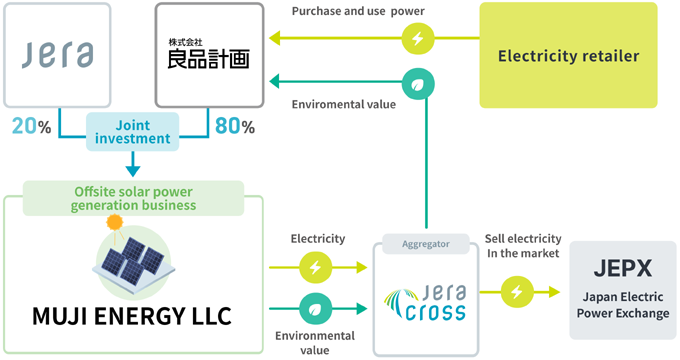Ryohin Keikaku and JERA have agreed to establish MUJI ENERGY, a special purpose company (SPC) to engage in renewable power generation business including the development of solar power generation facilities through joint investment and conduct the aforementioned business.
Ryohin Keikaku has also agreed with JERA Cross Co., a subsidiary of JERA to enter into a virtual power purchase agreement (PPA)(1) for transactions of the environmental value of renewable energy.
The agreement will allow Ryohin Keikaku to utilize the environmental value generated through solar power generation by MUJI ENERGY and procured via JERA Cross in order to reduce CO2 emissions associated with electricity consumption at Ryohin Keikaku, including MUJI tenant stores.

1. Project overview
This project brings together Ryohin Keikaku, which seeks to generate renewable energy with consideration for environment and local communities, and JERA, which has expertise in the development and maintenance of solar power plants, to collaborate in renewable power generation business. Combined with the creation of environmental value with additionality through the virtual PPA with JERA Cross, it also helps Ryohin Keikaku to achieve its CO2 reduction target. The three companies have been studying possibilities for collaboration, including the joint development of solar power plants to reduce CO2 emissions for Ryohin Keikaku (Ryohin Keikaku press release and JERA press release dated January 10, 2025).
Through MUJI ENERGY, a company established jointly by Ryohin Keikaku and JERA, the electricity and environmental value generated from solar power will be aggregated by JERA Cross. The electricity will be provided to Japan Electric Power Exchange (JEPX), and all of the environmental value will be acquired by Ryohin Keikaku. Ryohin Keikaku will utilize the environmental value to reduce CO2 emissions associated with electricity consumption in its business activities, including MUJI tenant stores and other locations.
More specifically, MUJI ENERGY plans to develop approximately 13 MW of power generation capacity within one year of establishment. This is equivalent to 20% of Ryohin Keikaku’s annual electricity consumption and is expected to reduce CO2 emissions by approximately 8,000 tons per year.
Ryohin Keikaku, JERA, and JERA Cross will develop solar power plants to expand the introduction of renewable energy and contribute to building a carbon-neutral and sustainable society.
2. Initiatives of the three companies
Aspiring to be a front runner of ESG management, Ryohin Keikaku has worked to reduce its CO2 emissions with the objective of achieving a 50% reduction in its total Scope 1 and 2 greenhouse gas emissions (“CO2 emissions”) by FY2030 compared to FY2021, by installing rooftop solar power generation systems at standalone MUJI stores and utilizing renewable energy utility plans. Ryohin Keikaku aims to further reduce its CO2 emissions by establishing a power generation company and creating environmental value with additionality through the virtual PPA to ensure the selection of facility sites with consideration for the surrounding natural environment and local residents.
JERA is an energy company with a mission to provide cutting-edge solutions to the world’s energy issues, owning a value chain that spans fuel upstream and procurement business to power generation and wholesale of electricity and gas. Under the banner of “JERA Zero CO2 Emissions 2050,” JERA aims to achieve, by 2050, virtually zero CO2 emissions from JERA’s operations in Japan and overseas by utilizing renewable energy and zero CO2 emission thermal power generation.
JERA Cross, a wholly owned subsidiary of JERA, offers assistance for corporate green transformation (GX) building on its strategic and technical expertise and renewable energy supply capabilities as a one-stop GX partner. It offers comprehensive assistance in areas ranging from the introduction of renewable energy, energy supply and demand management, providing 24/7 Carbon-free Energy(2), to developing GX strategies and co-creating business models, enabling companies achieve both decarbonization and growth.
(1) “A virtual PPA” refers to a long term agreement that trades only the environmental value within the electricity and environmental value by renewable energy .
(2) 24/7 Carbon-Free Electricity" refers to electricity that remains carbon-free 24 hours a day, 7 days a week, 365 days a year. In accordance with the Ministry of Economy, Trade and Industry's (METI) Guidelines on Retail Electricity Sales, this means that 100% of the electricity demand is met by zero-emission power sources, such as renewable energy generation facilities and hydrogen power generation facilities, and that the environmental value of non-fossil certificates is included in the supply. However, this does not imply that no CO₂ emissions occur throughout the entire lifecycle, including fuel production and transportation.
KeyFacts Energy: Woodside Australia country profile
 KEYFACT Energy
KEYFACT Energy